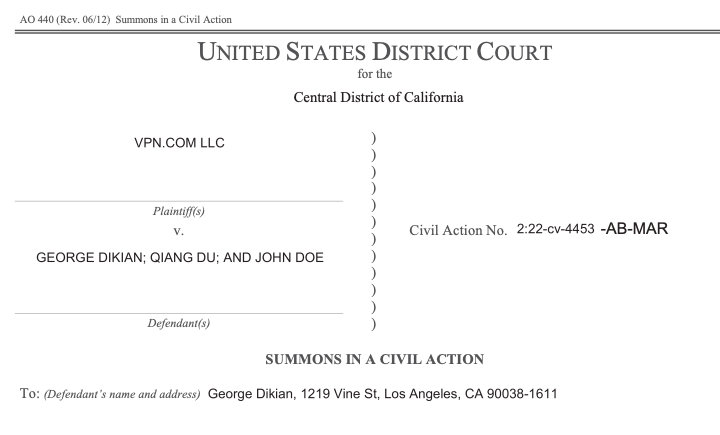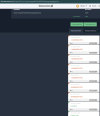I mentioned previously that we had only heard one side of the story.
An answer has been filed. The way that legal pleading works - just nailing down the basic factual outlines of what the plaintiff alleges, and what the defendant disputes, is fairly simple. It is not a process of argument, so much as simply identifying, in the complaint, where the defendant agrees, disagrees, or has insufficient information to respond (or where the complaint alleges a legal proposition instead of a factual one, in which case no response is required).
This answer, however, takes an interesting tack toward sketching out the arguments to come.
https://storage.courtlistener.com/recap/gov.uscourts.cacd.855964/gov.uscourts.cacd.855964.33.0.pdf
"On information and belief, based upon the
admissions in Plaintiff’s Complaint, it is Plaintiff that attempted to commit one
completely fraudulent domain name transaction. Apparently blinded yet guided
by nothing but greed, Plaintiff alleges that it was defrauded of some $250,000
worth of bitcoin (as of May 4, 2022 – worth about half that amount now), in the
process of perpetrating its own fraud, by which Plaintiff hoped to extract a
$2,150,000 so-called “commission” as an undisclosed dual agent for both parties
to the fictional transaction.
...
Dikian admits that Dikian is the professional alias identity of a well
known domain name investor and reseller. Dikian lacks knowledge or
information sufficient to form a belief as to the truth or falsity of the remaining
allegations of this Paragraph, and therefore denies the remaining allegations of
this Paragraph. On information and belief, based upon reasonable investigation,
the purported “escrow service” Intermediar.com was an obvious fraud that could
never be trusted in any transaction. For example, the purported escrow service
website contained a purported blog, with text that was simply copied and pasted
from other industry websites, such as Namecheap and Dan.com. More
significantly, in the website’s purported “Terms of Service”, no person or legal
entity was identified, the address was stated as a 14-story office building, and
there was no such registered company in the Netherlands as “Intermediar.com”
identified in the terms of service on the site (which also consisted of copied text
from a site called Paylax). These two facts make it immediately obvious that the
Intermediar.com website consisted mostly of text copied from other sites, and
failed to identify any existing person or legal entity of any kind which might be
held accountable. Yet, on information and belief based upon the allegations in
the Complaint, Plaintiff sought to conduct a transaction worth more than $6
million through this obviously fake “escrow service.” On information and belief
based upon experience in the domain name industry, such “fake escrow scams”
have been perpetrated and revealed publicly many times in the industry over
many years. Any purportedly professional domain name broker, as Plaintiff
purports to be, would never utilize such a “new” and obviously fraudulent
“escrow service” for any significant transaction.
...
On information and belief, based on long
experience in the domain name industry, it is unconscionable for any domain
name broker to charge a nearly 100% commission (based on the sales price) in
any transaction. Typical domain name brokerage commissions for multi-million
dollar transactions are in the range of 5% to 15%. Dual agency transactions such
as that described by Plaintiff are highly discouraged, if not illegal. Dikian states
that he has never and would never agree to any transaction proposed by a dual
agent disclosing a nearly 100% commission on the sales price.
...
Dikian denies that he has ever owned any bitcoin, transacted in
bitcoin, or operated any bitcoin wallet.
...
Dikian admits that on May 11, 2022, Dikian notified Plaintiff by
email from the email address [email protected], that the purported 89.com
transaction was not initiated nor agreed by Dikian, and that Dikian did not
receive any bitcoin from Plaintiff.
...
Dikian alleges that each and every cause of action stated in Plaintiff’s
Complaint is not brought in good faith, but for an improper purpose, and is
brought without reasonable cause, and is frivolous in nature, thereby subjecting
Plaintiff and/or Plaintiff’s counsel to the imposition of sanctions pursuant to
Rule 11 of the Federal Rules and/or the Court’s inherent powers."
---------
So, it would appear that we have a very sharply-defined contrast between the allegations of the Plaintiff and the contentions thus far of the Defendant.
The answer and the complaint merely mark the beginning of a lawsuit. The Plaintiff has made its claim and the Defendant has admitted or denied the various factual bases of the complaint.
No doubt the contentions of the parties are going to be resolved on facts yet to be known.
But how if it will be proofed that the emails are spoofed, and they realize that they had sued the wrong person?
Quite often, when someone is highly invested in a particular interpretation of their perception of the facts, it can be extremely difficult for that person to move from their interpretation even when strong evidence points to an error in either their perception of the facts or their interpretation of them. If you read comprehensive analysis reports of things like airplane disasters or industrial accidents (the Three Mile Island nuclear plant is a great study), you will often find someone who has made up their mind about the situation and continues to act on that conclusion even when they should have noticed their initial conclusion was incorrect.
The more interesting question is what sort of evidence is going to be available. I can think of quite a few things that should be subpoenaed from third parties. Obviously, the email providers, domain registrars, hosting service for intermediar, and so on, if the relevant logs still exist, will provide important information about access times and IP addresses. Of course, the users of the accounts may have used VPN's which, in itself, would be interesting in this particular context. But having seen hacked accounts from a service provider perspective, it is typical that the authorized user can be distinguished from the unauthorized one, merely by the patterns and methods of access (IP address, times of day, frequency, type of activity, metadata such as browser/device/software information, and so on).
Another interesting approach, if there is not a lot of technical data, is to look at Dikian himself. Obviously, VPN has email records with times and dates on them. Just as obviously, Dikian will possibly have records which make it unlikely for him to have been sending emails at those dates and times, unless you want to buy the proposition that Dikian was pretending to impersonate himself, or some crackers hypothesis like that. Additionally, here we also have written material from the alleged impersonator. There are methods by which, if provided with a collection of emails written by the actual George Dikian, the denied correspondence can be statistically and linguistically analyzed to determine the likelihood of authorship by Dikian. Even without Dikian, the emails can be analyzed for things like probable native language of the author (if not English), among other textual indicators of identity.
Finally, it is worth noting that "George Dikian" is apparently a business or professional name of the person in question. We live in a world where if you ask someone who is Issur Danielovitch Demsky or Marion Robert Morrison, you get a lot of shrugs.
Maybe someone else can tell us about Issur Danielovitch Demsky, Marion Robert Morrison, or a big favorite who might be more recognizable to a younger crowd, such as William Jefferson Blythe III.
But the versions of reality are quite distinct. Either Mr. Gargiulo is mistaken or Mr. Dikian is a thief.
Which reality do you believe to be more likely, and why?
















